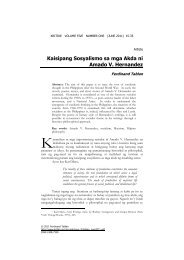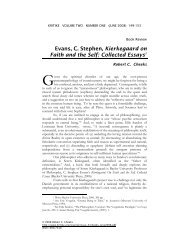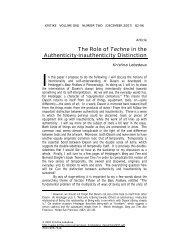The Paradox of Ipseity and Difference: Derrida's Deconstruction and ...
The Paradox of Ipseity and Difference: Derrida's Deconstruction and ...
The Paradox of Ipseity and Difference: Derrida's Deconstruction and ...
Create successful ePaper yourself
Turn your PDF publications into a flip-book with our unique Google optimized e-Paper software.
42 THE PARADOX OF IPSEITY AND DIFFERENCE<br />
presence is that in its evanescence its immediacy is lost within time itself.<br />
However, despite its fleeting nature, presence, leaves its traces behind, <strong>and</strong> these<br />
traces itself, constitutes the parts <strong>and</strong> intentions <strong>of</strong> such presence, which leaves<br />
us with some partial clues to reconstruct, <strong>and</strong> bring the lost presence through<br />
supplementation:<br />
<strong>The</strong> unheard difference between the appearing <strong>and</strong> the<br />
appearance (between the “world” <strong>and</strong> “lived experience”)<br />
is the condition <strong>of</strong> all other differences, <strong>of</strong> all other traces,<br />
<strong>and</strong> it is already a trace. This last concept is thus absolutely<br />
<strong>and</strong> by rights “anterior” to all physiological problematics<br />
concerning the nature <strong>of</strong> the engramme [the unit <strong>of</strong><br />
engraving], or metaphysical problematics concerning the<br />
meaning <strong>of</strong> absolute presence whose trace is thus opened<br />
to deciphering. <strong>The</strong> trace is in fact the absolute origin <strong>of</strong> sense in<br />
general. Which amounts to saying once again that there is no<br />
absolute origin <strong>of</strong> sense in general. <strong>The</strong> trace is the differance<br />
[différance] which opens appearance [l’apparaître] <strong>and</strong><br />
signification. Articulating the living upon the nonliving<br />
ideal than real, not more intelligible than sensible, not<br />
more a transparent signification than an opaque energy<br />
<strong>and</strong> no concept <strong>of</strong> metaphysics can describe it. And as it is a<br />
fortriori anterior to the distinction between regions <strong>of</strong><br />
sensibility, anterior to sound as much as to light, is there a<br />
sense in establishing a “natural” hierarchy between the<br />
sound-imprint, for example, <strong>and</strong> the visual (graphic)<br />
imprint? <strong>The</strong> graphic image is not seen <strong>and</strong> the acoustic<br />
image is not heard. <strong>The</strong> difference between the full<br />
unities <strong>of</strong> the voice remains unheard. And, the difference<br />
in the body <strong>of</strong> the inscription is also invisible. 41<br />
In this long passage from Of Grammatology, one will see why Derrida is<br />
having some difficulty in expressing his notion <strong>of</strong> trace as both the presence <strong>and</strong><br />
non-presence, primarily because traces are examples <strong>of</strong> presence <strong>and</strong> non-presence.<br />
Appearing <strong>and</strong> appearance already lends itself as a clue, or perhaps, a trace <strong>of</strong> what<br />
Derrida intends to convey, for appearing is different <strong>and</strong>, at the same time,<br />
similar to what appearance would convey. Appear-ing indicates a verb in the<br />
present progressive form, meaning that it is in the constant state <strong>of</strong> presence,<br />
indicating a constant temporal movement <strong>and</strong> not a fixed hypostatized<br />
condition. On the other h<strong>and</strong>, appearance differs from appearing, in so far as it is<br />
a noun that indicates an impression <strong>of</strong> an object, <strong>and</strong> thus a hypostatized state in<br />
which an object is thought to be in. In relation to this, the trace is something that<br />
is appearing, <strong>and</strong> understood as an appearance. <strong>The</strong> difference is given emphasis<br />
by Derrida as an epistemic condition; for in our intention to perceive what is<br />
41 Ibid., 65.
















